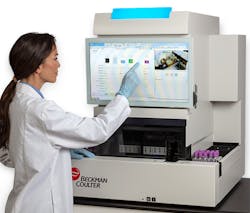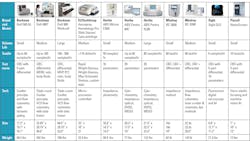Hematology analyzers vary in size, having the ease of automation for precise assessment of blood, and in some analyzers, other bodily fluids as well.
When to upgrade
Labs may seek to upgrade based on the needs of the patient population, desire to upgrade to a newer version, to increase testing,or to automate from single sample to autoloader.
Technologies advance, but with budget limits, labs may keep and use instruments longer. Retaining older instruments risks parts and software availability, with increased maintenance. Newer technologies improve workflows, providing more ecologically friendly reagents, and clinically relevant parameters.
When purchasing, labs should consider cost per test, interface time, potential chemical exposure, and high first-pass yields to improve turnaround time.
The technical features
According to product descriptions, Sight and PixCell offer analyzers that combine artificial intelligence with single-use cartridges that do not require calibration or chemical exposure, designed for smaller-sized labs needing quick results.
To lessen exposure to toxic chemicals, Mindray offers cyanide-free reagents, as well as barcoded reagents for their analyzers.
Many hematology analyzers offer automated maintenance. Features vary, as Horiba’s product description explains its patented technology, such as DHSS (Double hydrodynamic sequential system) technology for accurate cell-by-cell counting and MDSS (Multi-distribution sampling system) for precision pipetting with tangential flow for mixing of the dilution with the sample in the reaction chamber.
Like Horiba, Beckman Coulter offers analyzers of all sizes. Beckman Coulter’s Monocyte Distribution Width (MDW) test is a hematology-based cellular biomarker designed to identify patients with severe infection leading to sepsis, reported automatically with routine complete blood count (CBC) with differential to count and identify the differnt types of white blood cells (WBC) on the DxH 900 and DxH 690T.
“The value of MDW,” explained Elliott Crouser, MD, Professor of Critical Care Medicine, Ohio State University Wexler Medicial Center, in a Beckman Coulter testimonial, “is that it provides physicians with an earlier indication of sepsis.”
To accompany analyzers
ELITechGroup’s Aerospray Hematology Pro Slide Stainer and Cytocentrifuge pairs with CellaVision DC-1 and DM1200 for microprocessor-controlled slide staining and cell preparation. The product description details how the Cytopro Rotor accessory gives full-featured cytocentrifuge capability.
To accelerate the release of LC/MS and GC/MS results, ASCENT from Indigo BioAutomation is a software for preventing data release bottlenecks. When samples are not clean, ASCENT uses machine learning to resolve the peak management of cases near the baseline, suffering co-elution, or have lost sensitivity and specificity to distinguish the true peak signal within the chromatographic trace.
About the Author
Marisa L. Williams
Editor
The author of more than 100 independently published books, Marisa L. Williams earned her Master’s at Johns Hopkins University, while interning on Capitol Hill, doing press and communications for the National Association of Community Health Centers. Creating her own Bachelor of Science degree at the University of Toledo, Williams blended pre-medical, pre-law, and laboratory studies, resulting in an interdisciplinary degree emphasizing Forensics. She has worked with Dr. Paulette Moulton (Levy), a dermatologist in Monroe, MI, as well as Dr. Elizabeth Triana, a family medicine practitioner specializing in hormone therapy, based out of Port Charlotte, FL; additionally, she has 20 years of experience as a multimedia journalist, is a third generation Realtor licensed in MI and FL, and has five years of college level teaching experience.


